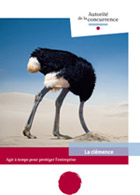22 November 2012: Revision of the Model Leniency Programme

The competition authorities within the European Competition Network (ECN) approved today a refined version of the Model Leniency Programme
The amendments will simplify the introduction of parallel leniency applications by widening the summary applications system and by clarifying certain key notions of the programme.
The heads of the ECN competition authorities, gathered today in Brussels, have approved several amendments to the Model Leniency Programme (hereinafter MLP) which all together contribute towards strengthening the attractiveness of the leniency procedure in situations where it would be in an undertaking’s interest to apply for leniency to several different competition authorities.
The Model Leniency Programme
The MLP, adopted in 2006, is the result of a working group formed within the ECN and co-chaired by the French Conseil de la concurrence and the British Office of Fair Trading.
The elaboration of the MLP met the need to ensure a convergent treatment of leniency applications by ECN members, in order to guarantee that potential leniency applicants are not discouraged from applying in the first place. Indeed, within the framework of a system of parallel competences for the application of Article 101 of the Treaty, an undertaking may find itself in a situation such that it would be in its own interest to submit an application for leniency to several competition authorities. Yet, certain divergences between some leniency programmes within the ECN may limit these incentives to submit an application for leniency and thus harm the effectiveness of leniency as a key instrument in the fight against cartels.
The MLP thus includes a set of rules and principles which do not create any rights for undertakings but which the ECN competition authorities have agreed to reflect in their own programmes. Furthermore, the MLP introduces a summary application system aiming to alleviate the burden, for both undertakings and authorities, associated with the necessity to submit multiple applications for leniency in the case where the European Commission is particularly well placed to deal with the case.
The main changes brought today
The adoption of the MLP in 2006 created a real momentum: as of today, 27 ECN authorities have leniency programmes that are generally aligned with the MLP. Particularly, the French Conseil de la concurrence refined its leniency programme on 17 April 2007 in order to reflect these common principles and its content has since then been taken up by the Autorité de la concurrence in its procedural notice of 2 March 2009.
The revision of the MLP, which the Autorité actively took part in, strengthens more particularly the summary applications system, for the benefit of both undertakings and competition authorities:
- The use of summary applications is widened, beyond applications likely to result in full immunity, to all applicants, regardless of their order of arrival;
- A standard template, also published today, can be filled in by an undertaking in order to submit a summary application to any ECN competition authority.
Moreover, the revised text includes clarifications on the scope of the applicant’s duty to cooperate, which applies throughout the procedure, as well as on the practices covered by the MLP (i.e., the notion of secret cartels). It also clarifies that the ECN competition authorities should offer the same level of protection against disclosure for written and for oral leniency statements.
The documents are available on the ECN website: http://ec.europa.eu/competition/ecn/documents.html
By contributing actively to the revision of the MLP, the Autorité wanted to reassert one of its priorities: the fight against cartels, the most harmful type of infringement with regard to its incidence on the economy and consumers. The leniency programme proves to be one of the most useful instruments to detect them. The Autorité has, furthermore, named a Leniency Officer whose main task is to take part in the hearings of the undertakings and to provide its expertise to the investigation services in charge of a leniency case. Lastly, the Autorité has also just published a booklet detailing the leniency procedure in an accessible manner for the use of companies.
To read the booklet (in French).

> Press contact : André Piérard - Tel.: (+ 33) 1 55 04 02 28 - Contact by email
